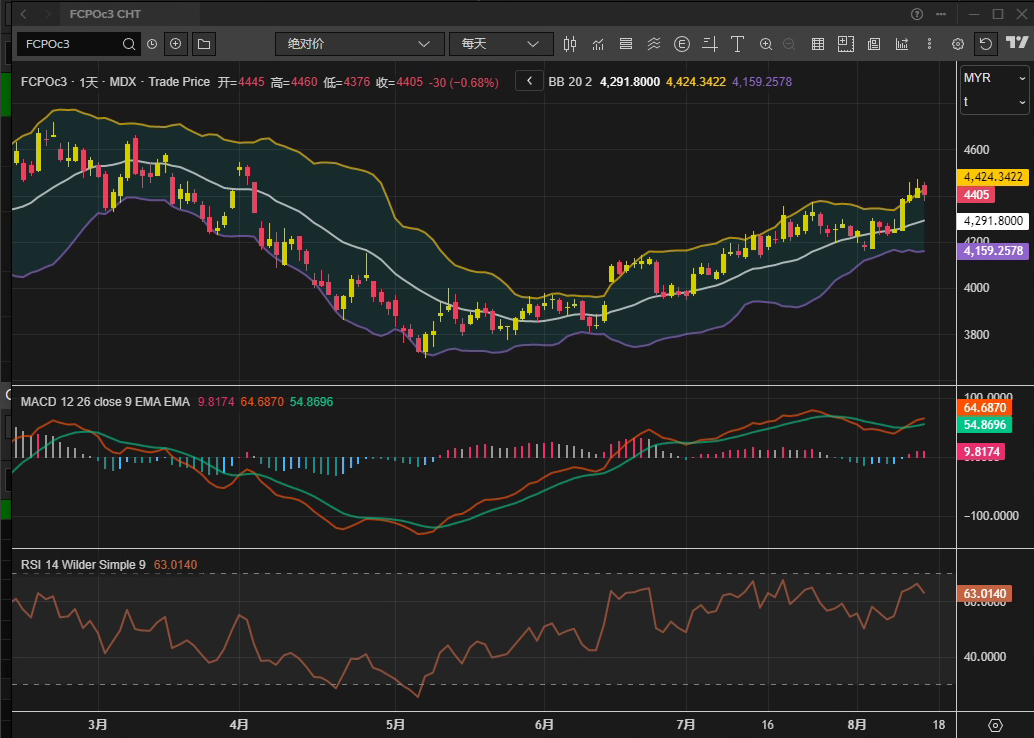The battle for palm oil's high-level "match point": Is 4,400 ringgit a bullish defense or a bearish breakthrough?
2025-08-14 18:32:19

Policy Game: Indonesia's B50 Plan Faces Industry Resistance
Market focus today focused on public statements by Eddy Martono, Chairman of the Indonesian Palm Oil Association (GAPKI). According to local media reports, GAPKI called on the government to postpone the planned mandatory blending of B50 biodiesel (currently B35), citing "industry lack of preparedness." Although Indonesian officials quickly denied receiving a formal proposal, the news still sparked market concerns about policy implementation. Anilkumar Bagani, Head of Research at Sunvin Group in Mumbai, noted: "The decline in futures prices directly reflects the market's pricing in of a B50 extension. If the policy is postponed, Indonesian palm oil inventory pressures could intensify."
It's worth noting that Malaysia simultaneously raised its September crude palm oil export reference price, raising the export tariff to 10%, which may dampen short-term demand. Furthermore, the ringgit depreciated 0.12% against the US dollar, which, while supporting export prices, failed to offset the negative impact of policy expectations.
Demand-side differentiation: India shifts to compete with global oils and fats
India's latest data shows a month-over-month decline in palm oil imports in July, with some import contracts canceled, while soybean oil imports hit a three-year high. This structural shift stems from favorable South American soybean oil prices and the concentrated arrival of delayed June shipments. Meanwhile, soybean oil futures (DBYcv1) on the Dalian Commodity Exchange in China fell 0.47%, while palm oil futures (DCPcv1) plummeted 1.09%. Chicago Board of Trade (CBOT) soybean oil prices also fell 0.9%, reflecting a coordinated correction in the global vegetable oil market.
Institutional view: Short-term adjustments do not change the medium- and long-term logic
Most analysts believe today's decline is more of a technical correction than a trend reversal. A researcher at a prominent Asian oils and fats research institution noted, "The B50 controversy may be over-interpreted by the market. The Indonesian government has repeatedly emphasized the priority of biodiesel policy. If it is ultimately implemented as planned, palm oil industry demand will be strongly supported." Furthermore, expectations remain that Malaysia's production growth will slow in August, and the pace of inventory rebuilding may be slower than in previous years.
Looking ahead, palm oil prices are likely to remain volatile at high levels in the short term, with the MYR 4,400 mark becoming a key battleground for both bulls and bears. If policy uncertainty in Indonesia is resolved, coupled with the arrival of the traditionally peak consumption season in the fourth quarter, prices are expected to resume their upward trend. However, caution should be exercised regarding the impact of changes in India's purchasing pace and the soybean-palmwood price differential on demand.

- Risk Warning and Disclaimer
- The market involves risk, and trading may not be suitable for all investors. This article is for reference only and does not constitute personal investment advice, nor does it take into account certain users’ specific investment objectives, financial situation, or other needs. Any investment decisions made based on this information are at your own risk.





















